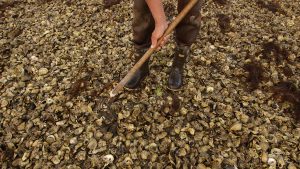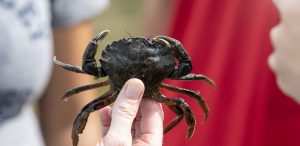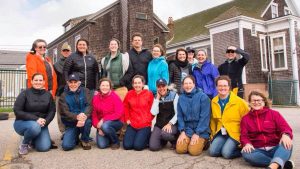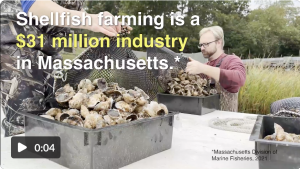Search results for: REGVIP how to get betwinner promo code Chile
WHOI-W-05-001 Whitlach, B. International Inv
WHOI-W-05-001 Whitlach, B. International Inv
Read MoreEnjoying Oysters Safely in Massachusetts
Each year, millions of fresh raw oysters are consumed in Massachusetts, most of them in the warm summer months. During that time, aquaculturists in the Commonwealth take extra precautions to safeguard their harvests from the heat, include icing oysters at the time of harvest – a step that can double or triple the weight of…
Read More“Marine Invaders” Educator Workshop Scheduled for December
Marine Invaders: Green crabs and other species are the featured subjects in the next WHSG Topics in Oceanography (TIO) workshop for informal and formal educators grades 6-12. The workshop is scheduled for Friday, December 3 from 9 a.m. – 4 p.m. at the Woods Hole Oceanographic Institution. The Woods Hole Sea Grant Program, WHOI Information Office,…
Read MoreShellfish Resource Management in Massachusetts
Shellfish Resource Management in Massachusetts Helpful to educators and students. Leavitt, D.F. Focal Points, 3 pp., 2000 WHOI-G-00-003
Read MoreTeacher-at-Sea Alumni Connect with Woods Hole Sea Grant
For educators who want to teach young people about ocean science, the opportunity to work with world-renowned scientists and experience life at sea aboard a research vessel is a dream come true. The NOAA Teacher at Sea Program gives teachers that opportunity, sending select teachers on research expeditions that last anywhere from two weeks to…
Read MoreResuspension of Postlarval Soft-Shell Clams Mya arenaria through Disturbance by the Mud Snail Ilyanassa obsoleta
Resuspension of Postlarval Soft-Shell Clams Mya arenaria through Disturbance by the Mud Snail Ilyanassa obsoleta Dunn, R., L.S. Mullineaux, and S.W. Mills Marine Ecology Progress Series, Vol. 180, pp. 223-232, 1999 WHOI-R-99-010
Read MoreWHOI-R-05-004 Bernhard, A. E. Loss of Divers
WHOI-R-05-004 Bernhard, A. E. Loss of Divers
Read MoreCoastal Impacts Newsletter – March 2024
Coastal Impacts WHOI Sea Grant Newsletter March 2024 Table of Contents SUBSCRIBE » Newsletter subscribe form ISSUE ARCHIVE » Read past issues of Coastal Impacts CURRENT ISSUE » “Coastal Impacts” home Follow us on Facebook!@WHOISeaGrant Tweet us on Twitter@WHOISeaGrant Find us on Instagram@WHOISeaGrant Sorry, we couldn’t find any posts. Please try a different search.…
Read MorePerigean Spring Tides — Predicting Potential Disasters: How Tidal Information May Save You From a Coastal Crisis
Perigean Spring Tides — Predicting Potential Disasters: How Tidal Information May Save You From a Coastal Crisis Helpful to educators and students. Giese, G.S. Marine Extension Bulletin, 2 pp., 1998 WHOI-G-98-007
Read More2004-2006 Projects
Oil Undercover: Ecological Effects of a 30-year-old Oil Spill Since 1969, when the barge Florida, headed for the Cape Cod Canal, ran aground and spilled over 650,000 liters of No. 2 fuel oil on a pristine section of Cape Cod coastline, Woods Hole scientists have studied the salt marsh sediments for ecological effects and recovery.…
Read More



